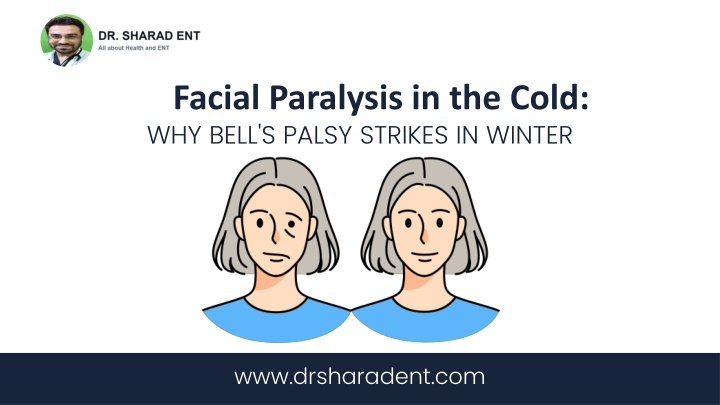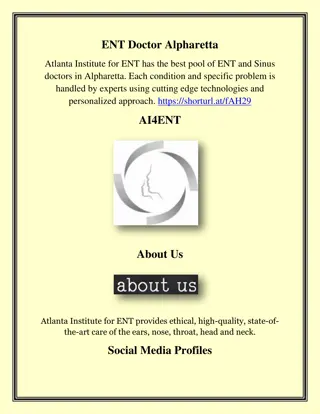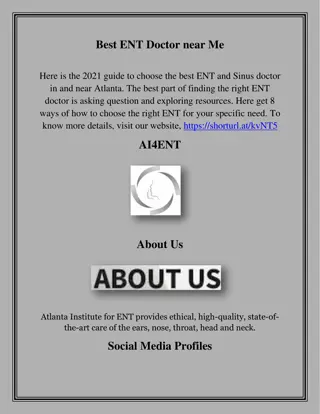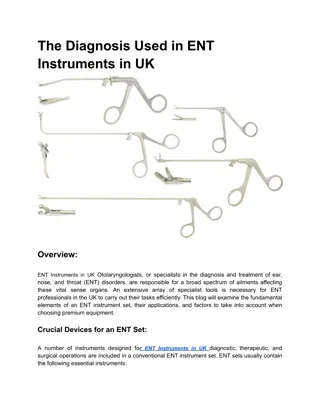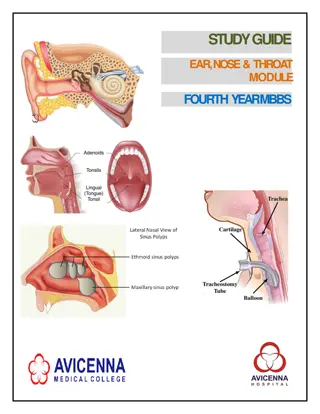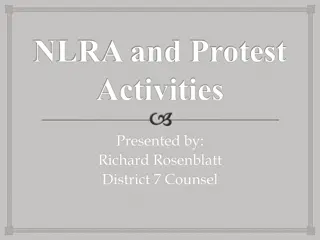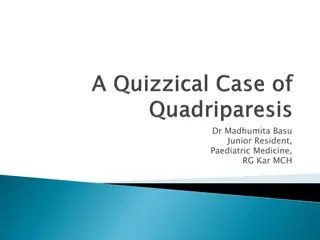Facial Paralysis in the Cold: Why Bell's Palsy Strikes in Winter - Dr Sharad ENT
Bell's palsy is a temporary facial paralysis affecting one side of the face, often linked to viral infections and stress. Cold exposure in winter is considered a possible trigger due to increased viral illnesses, reduced blood flow, and irritation of
Download Presentation

Please find below an Image/Link to download the presentation.
The content on the website is provided AS IS for your information and personal use only. It may not be sold, licensed, or shared on other websites without obtaining consent from the author.If you encounter any issues during the download, it is possible that the publisher has removed the file from their server.
You are allowed to download the files provided on this website for personal or commercial use, subject to the condition that they are used lawfully. All files are the property of their respective owners.
The content on the website is provided AS IS for your information and personal use only. It may not be sold, licensed, or shared on other websites without obtaining consent from the author.
E N D
Presentation Transcript
Facial Paralysis in the Cold: WHY BELL'S PALSY STRIKES IN WINTER www.drsharadent.com
Introduction to Bells Palsy Definition: Bell's palsy is a sudden, temporary weakness or paralysis of one side of the face. Affects: Can impact anyone, regardless of age or health. Possible Triggers: Viral infections, stress, facial injury, and cold weather exposure. www.drsharadent.com
What is Bells Palsy? Description: Also known as seventh cranial nerve paralysis. Caused by inflammation or damage to the facial nerve, disrupting brain-muscle communication. Symptoms: Drooping on one side of the face. Difficulty smiling, closing eyes, or maintaining facial expressions. Recovery: Usually temporary, with recovery time ranging from weeks to months. Treatments: Steroids or antiviral drugs can improve outcomes. www.drsharadent.com
Link Between Cold Exposure and Bells Palsy Viral Infections Role: Cold as a Potential Trigger: Cold exposure, especially in winter, is increasingly viewed as a primary cause. Cultural beliefs in Asia and Europe support the idea of cold-induced paralysis. Viral infections, particularly herpes simplex, are considered key triggers. www.drsharadent.com
How Cold Weather Increases the Risk of Bells Palsy Viral Infections & Weakened Immune System: Cold weather often leads to an increase in flu and cold infections. Winter conditions encourage more indoor time, increasing infection transmission. Constriction of Blood Vessels: Cold causes blood vessels to narrow, reducing blood flow to the face. Restricted blood flow may worsen nerve inflammation, especially if previously infected. Direct Cold Exposure: Wind, cold air, or sudden drafts may irritate the facial nerve directly. Abrupt exposure or insufficient protection against cold increases vulnerability. www.drsharadent.com
Conclusion Summary: Our mission is to provide exceptional, compassionate, and accessible healthcare to all individuals and communities we serve. :Preventive Tips Stay warm, protect against sudden temperature changes, and maintain health during winter. Closing Note: As winter approaches, remember to stay warm and attentive to your body s responses. www.drsharadent.com
Thank You Consult a healthcare provider for tailored treatment options for sinusitis. www.drsharadent.com Dr. Sharad ENT Dr. Sharad ENT Videos
